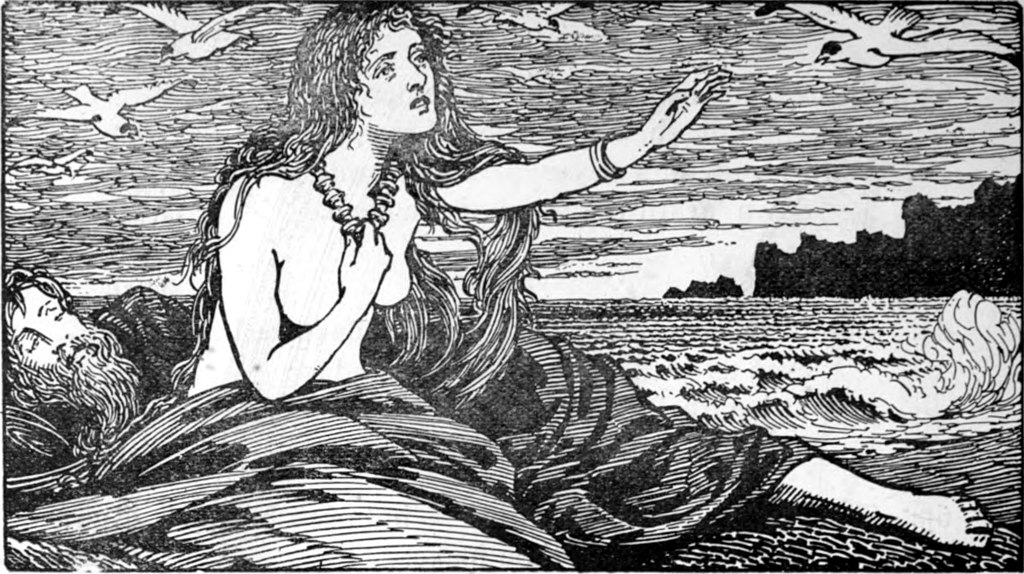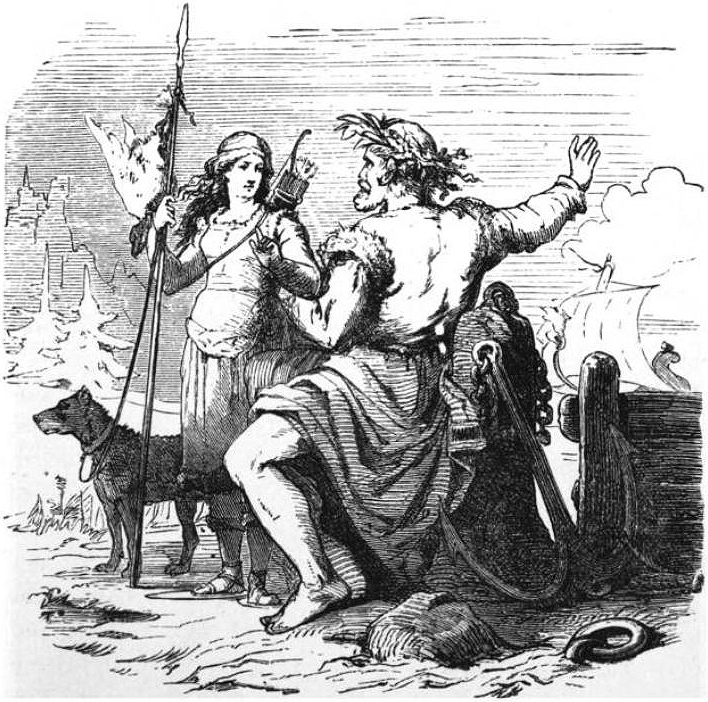In Norse mythology, Njord is a Vanir god. He is the father of the god Frey and the goddess Freyja. Although he was married to the goddess Skaði in an ill-fated and loveless relationship, she was not the mother of his children, which was, very strangely, his sister.
Of What is Njord the god of?
Njord is the Norse god of wind. He was a deity of the sea and all its riches, and seafarers and hunters worshipped him. Njord was also a god of prosperity.
Njord Pronunciation
“Njord” is pronounced “Ny-ord” but as one syllable, and you must roll the “r.”
The Old Norse spelling of Njörðr or Njǫrðr has been anglicized as Njord, Njoerd, or Njorth.
Interesting facts about the Norse god Njord
The Vanir god Njord lived in Nóatún (Old Norse: Njörðr; meaning: “ship-enclosure”). According to the Gylfaginning section of the 13th-century collection of Norse tales by the Islandic politician, historian, and poet Snorri Sturluson, Nóatún is a port located “in Heaven.”
Njord is identified with many things, but mainly with the sea and seafaring, the winds, wealth, and crop fertility. He is also attested in the Poetic Edda, a series of poems compiled in the same century.
In another work by Sturluson, Njord appears as a beloved mythological early king of Sweden in Heimskringla, a book of tales about Norwegian and Swedish kings.
He was one of the three gods invoked in the 14th-century Hauksbók ring oath, and “Njor” is thanked for a bountiful catch of fish in Norwegian literature well into the 19th century.
The more ancient Germanic goddess Nerthus is also connected to Njord. The name Nerthus resembles the feminine form of Njord used around year one of the Common Era (or 1 AD).
Sources suggest this relationship may indicate an association between Njord and Nerthus, such as brother and sister. Therefore, Nerthus could be the unnamed sister who bears Freyja and Freyr, with Njord as the father.
Njord is often compared to the legendary Danish king Hadingus: they both liked to be near the sea, hated wolves, and their wives chose them based on how beautiful their feet were!
Is Njord Vanir or Æsir?
Njord was one of the principal gods of the Vanir before being sent to Asgard.
His daughter, Freya (or Freyja), and his son, Freyr (or Frey), accompanied him as a part of the accords after the Æsir-Vanir War.
What is the Symbol of Njord?
Njord was a Norse god of the sea, and his main symbol was a ship, although there are images depicting him holding an oar, a trident, and a fishing net.
Where was Njord Born?
Njord was originally from Vanaheim.
However, he lived in Asgard, moving there as part of an exchange of prisoners after the war with Vanaheim.
Is Njord Related to Odin?
No.
However, Odin dissolved the marriage between Njord’s son Freyr and daughter Freyja as unnatural.
Odin and Njord feature together in three excerpts from Heimskringla (written around 1220 and translated as “Orb of the World”). Heimskringla was written by the Islandic politician, historian, and poet Snorri Sturluson and is a collection of tales about the early Norwegian kings.
In chapter 4, Odin appointed Njord and Freyr as priests of sacrificial offerings, and they became gods among the Æsir. Freyja was named as Njord’s daughter and was a priestess at the killings. In the tale, Njord married his unnamed sister while still a Vanir, and the couple produced Freyr and Freyja, although this custom was prohibited among the Æsir.
Chapter 5 states that Odin provided temple priests with fine properties, which is how Njord ended up living in Nóatún.
Chapter 8 states that Njord married a woman named Skadi, but she did not consummate the marriage, and they separated. Skadi married Odin and gave him several sons.
Odin dies in Chapter 9, and Njord becomes the Swedish ruler. Njord’s reign was characterized by abundant harvests, peace, and prosperity, so much so that the people believed he could control crops and wealth. His body was burnt in tribute by the Swedes when he died, and there was great mourning.
His son Freyr succeeded him as king, and he too was well-loved and presided over more good harvests.
Who is Njord’s Wife?
In the Prose Edda story Gylfaginning, Hár states that Skaði is Njörðr’s wife.
Skaði (also known as Skadi, Skade, or Skathi) is associated with winter, skiing, bowhunting, skiing, and mountains.
Hár also says Skadi is the daughter of the jötunn Þjazi, who was burnt to death while pursuing Loki and Idun (keeper of the magic life-giving apples) back to Asgard. As compensation, Skadi is told she can choose a husband from among the Æsir.
She chooses Njord by mistake as she believes his beautiful feet (the only part she can see of the men before her) must belong to the handsome and powerful Baldr.

Hár also tells of how ill-suited Skadi and Njord were. Skadi was at home in the mountains hunting with a bow, while Njord wanted to live by the sea. They both agreed to try each other’s lands to see if they could settle there.
Njord says:
Hateful for me are the mountains,
Njord: The Viking God of the Sea: A Modern Guide – MythologySource
I was not long there,
only nine nights.
The howling of the wolves
sounded ugly to me
after the song of the swans.
Skaði responds:
Sleep I could not
Skade Tjatsedotter (deceased) – Genealogy – Geni
on the seabeds
for the screeching of the bird.
“That gull wakes me
when from the wide sea
he comes each morning.
They went their separate way afterward, Skadi returning to her family home, Þrymheimr.
In Heimskringla, Skaði is no longer with Njord and has married the god Odin, the two producing many children together.
In the Prose Edda and the Poetic Edda, Skadi places the serpent that drips venom onto Loki.
Skadi is also referred to as Öndurdís or Öndurguð (goddess of skiing in Old Norse).
Does Njord Marry his Sister?
Scholars believe that Njord could have been the masculine version of an earlier fertility goddess called Nerthus (or Mother Earth).
This theory might be the basis of the story that Njord’s first wife was his own sister (Nerthus), who bore him Frey and Freyja.

The Mentions of Njord in the Eddas
Poetic Edda
In stanza 39 of the poem Vafþrúðnismál, Njord is one of the few Æsir survivors of Ragnarök (“the doom of men”) and returns to live in Vanaheim.
We discover this when Odin (disguised this time as Gagnráðr participates in a verbal joust with the jötunn Vafþrúðnir. Odin says the giant is aware of every god’s fate and asks him where Njord came from before being taken hostage and sent to Asgard, as he was not raised there. Vafþrúðnir replies:
In Vanaheim, the wise Powers made him
Aesir, Vanir and the Joktun – Historium
and gave him as a hostage to the gods;
at the doom of men, he will come back
home among the wise Vanir.
Stanza 16 of the poem Grímnismál describes how Njord built a hall in Nóatún (a “high-timbered temple”), how he is a prince among men, and that he is not malicious. Stanza 43 confirms Freyr is his son and tells of the construction of Freyr’s ship, Skíðblaðnir.
In the introduction to the poem Skírnismál and its subsequent stanzas, Freyr is again cited as Njord’s son, while stanza 2 mentions that the goddess Skadi is his mother.
Loki and Njord have verbal exchanges in the poem Lokasenna (Loki’s verbal jousts). Loki mocks Freyja about her dubious parentage, which Njord responds to by saying:
That’s harmless, if, besides a husband, a woman has
Freyr – Glosbe
a lover or someone else;
what is surprising is a pervert god coming in here,
who has borne children
Loki answers in stanza 34, saying, “from here, you were sent east as a hostage to the gods” (a reference to the prisoner exchange after the war between the Æsir and the Vanir) and “Hymir’s daughters used you as a pisspot and peed in your mouth.
Njord keeps his cool and wisely responds thus:
That was my reward, when I, from far away,
The Poetic Edda – page 90
was sent as a hostage to the gods,
that I fathered that son, whom no one hates
and is thought the prince of the Æsir.
Loki tells Njord he is ready to reveal the secret of how Freyr resulted from Njord’s relationship with his sister, although he admits “you’d expect him to be worse than he is.”
The god Tyr then becomes the object of Loki’s verbal barbs.
Prose Edda
In the Prose Edda, Njord first appears in chapter 23 of Gylfaginning. Hár describes Njord as living in the heavenly Nóatún.
Hár (or Hávi, High and Hárr; translated as “one-eyed”) is an important figure as he is one of the many aliases of Odin. In the Prose Edda, he is a member of the trio along with Jafnhárr and Þriði that respond to the questions posed by Gangleri (the Scandinavian king Gylfi in disguise).
Hár mentions that Njord controls the movement of the winds and can direct sea and fire. He tells of Njord’s powers with seafaring and fishing and that he is prosperous and wealthy, able to help those who came to him seeking help with land and money.

